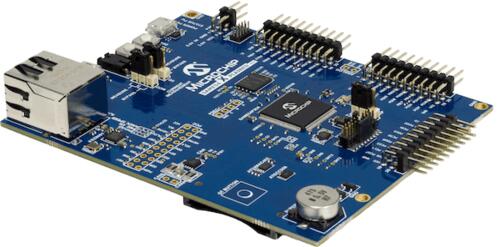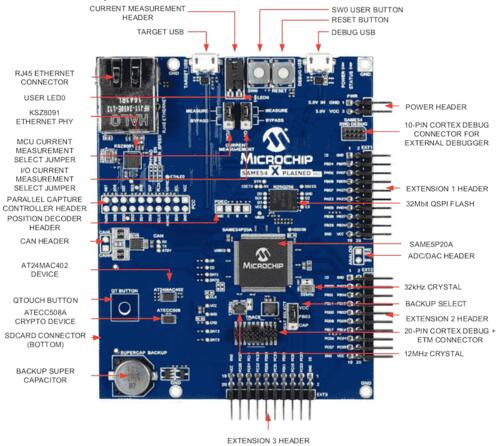SAM E54 Xplained Pro Evaluation Kit
Overview
The SAM E54 Xplained Pro evaluation kit is ideal for evaluation and prototyping with the SAM E54 Cortex®-M4F processor-based microcontrollers. The kit includes Atmel’s Embedded Debugger (EDBG), which provides a full debug interface without the need for additional hardware.

Hardware
SAME54P20A ARM Cortex-M4F processor at 120 MHz
32.768 kHz crystal oscillator
12 MHz crystal oscillator
1024 KiB flash memory and 256 KiB of RAM
One yellow user LED
One mechanical user push button
One reset button
On-board USB based EDBG unit with serial console
One QTouch® PTC button
32 MiB QSPI Flash
ATECC508 CryptoAuthentication™ device
AT24MAC402 serial EEPROM with EUI-48™ MAC address
Ethernet
RJ45 connector with built-in magnetics
KSZ8091RNA PHY
10Base-T/100Base-TX IEE 802.3 compliant Ethernet transceiver
USB interface, host, and device
SD/SDIO card connector
Supported Features
The same54_xpro board configuration supports the following hardware features:
Interface |
Controller |
Driver/Component |
|---|---|---|
ADC |
on-chip |
adc |
DAC |
on-chip |
dac |
DMAC |
on-chip |
dma |
EEPROM |
i2c |
eeprom, EUI-48 MAC Address |
EIC |
on-chip |
interrupt_controller |
GMAC |
on-chip |
ethernet, mdio |
GPIO |
on-chip |
gpio |
MPU |
on-chip |
arch/arm |
NVIC |
on-chip |
arch/arm |
NVMCTRL |
on-chip |
flash |
PORT |
on-chip |
pinctrl |
RTC |
on-chip |
timer |
SERCOM I2C |
on-chip |
i2c |
SERCOM SPI |
on-chip |
spi |
SERCOM USART |
on-chip |
serial, console |
Serial Number |
on-chip |
hwinfo |
SYSTICK |
on-chip |
timer |
TC |
on-chip |
counter |
TCC |
on-chip |
counter, pwm |
TRNG |
on-chip |
entropy |
USB |
on-chip |
usb |
WDT |
on-chip |
watchdog |
Other hardware features are not currently supported by Zephyr.
The default configuration can be found in the Kconfig boards/atmel/sam0/same54_xpro/same54_xpro_defconfig.
Pin Mapping
The SAM E54 Xplained Pro evaluation kit has 4 GPIO controllers. These controllers are responsible for pin muxing, input/output, pull-up, etc.
For more details please refer to SAM D5x/E5x Family Datasheet [1] and the SAM E54 Xplained Pro Schematic [2].

Default Zephyr Peripheral Mapping:
SERCOM2 USART TX : PB24
SERCOM2 USART RX : PB25
GPIO/PWM LED0 : PC18
GPIO SW0 : PB31
GMAC RMII REFCK : PA14
GMAC RMII TXEN : PA17
GMAC RMII TXD0 : PA18
GMAC RMII TXD1 : PA19
GMAC RMII CRSDV : PC20
GMAC RMII RXD0 : PA13
GMAC RMII RXD1 : PA12
GMAC RMII RXER : PA15
GMAC MDIO MDC : PC11
GMAC MDIO MDIO : PC12
SERCOM4 SPI SCK : PB26
SERCOM4 SPI MOSI : PB27
SERCOM4 SPI MISO : PB29
SERCOM7 I2C SDA : PD08
SERCOM7 I2C SCL : PD09
USB DP : PA25
USB DM : PA24
System Clock
The SAME54 MCU is configured to use the 32.768 kHz external oscillator with the on-chip PLL generating the 48 MHz system clock.
Serial Port
The SAME54 MCU has 8 SERCOM based USARTs with one configured as USARTs in this BSP. SERCOM2 is the default Zephyr console.
SERCOM2 115200 8n1 connected to the onboard Atmel Embedded Debugger (EDBG)
PWM
The SAME54 MCU has 5 TCC based PWM units with up to 6 outputs each and a period
of 24 bits or 16 bits. If CONFIG_PWM_SAM0_TCC is enabled then LED0 is
driven by TCC0 instead of by GPIO.
SPI Port
The SAME54 MCU has 8 SERCOM based SPIs.
I2C Port
The SAME54 MCU has 8 SERCOM based I2Cs. On the SAM E54 Xplained Pro, SERCOM7 is connected to a AT24MAC402 EEPROM and a ATECC508A Crypto Authentication device.
Programming and Debugging
The SAM E54 Xplained Pro comes with a Atmel Embedded Debugger (EDBG). This provides a debug interface to the SAME54 chip and is supported by OpenOCD.
Flashing
Build the Zephyr kernel and the
hello_worldsample application:west build -b same54_xpro samples/hello_world
Connect the SAM E54 Xplained Pro to your host computer using the USB debug port.
Run your favorite terminal program to listen for output. Under Linux the terminal should be
/dev/ttyACM0. For example:$ minicom -D /dev/ttyACM0 -o
The -o option tells minicom not to send the modem initialization string. Connection should be configured as follows:
Speed: 115200
Data: 8 bits
Parity: None
Stop bits: 1
To flash an image:
west build -b same54_xpro samples/hello_world west flash
You should see “Hello World! same54_xpro” in your terminal.